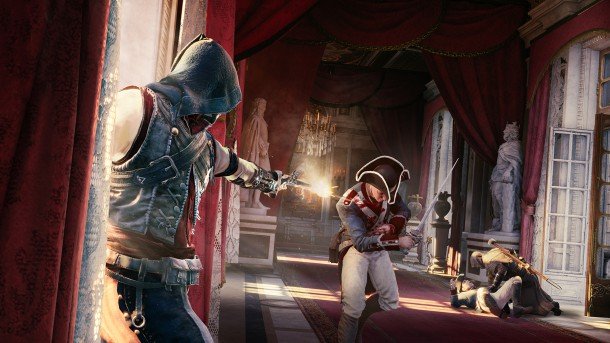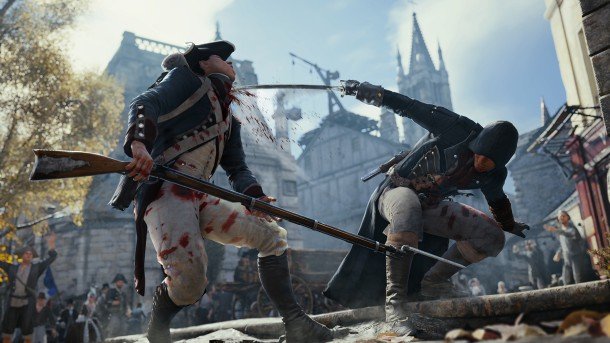Assassin's Creed: Unity dev talks player freedom and open-ended assassinations

After getting duly excited about yesterday's big reveal of Assassin's Creed: Unity 's four-player co-op mode and NPC-packed setting, Sam successfully snuck past the guards at E3 to find out more info. He spoke with Alexandre Amancio, creative director at Ubisoft Montreal, about the changes Ubisoft is making to the way Assassin's Creed handles freedom and complexity.
PC Gamer: There's some small things about Assassin's Creed that I and few of my friends have an issue with that are being addressed in this. You've added a layer of complexity to every major part of the game—the free-running down from buildings, the combat encourages more experimentation. Was this a goal from the start?
Alexandre Amancio: For navigation, we definitely wanted to give more control. We felt that we tried to guess a little too much what the player wanted. Whenever you try to guess what the player wants, you have a percentage of chance that you get it wrong. And that's what generates these frustrating moments when you're trying to tail a character and you get stuck on the wall, right? So we're trying to guess with one button, what the player wants to do in any given situation. So by adding that second layer of control—free run up or free run down—we're just adding one button, but it's eliminating a lot of problems. Now, not only does it give the player more agency, it removes the need for those haystacks, which are ingredients. You have to do them exactly where we place the haystack. We want you to be able to do that wherever you want, and we want you to have the simple control to do so, so it's not very complicated. You hold down the right trigger and A and you go up, you hold B and you're gonna control down. So that was the theory behind the navigation.
Our combat system right now is actually more streamlined. It's simpler because it's less of a tree structure, but it's deeper because it's more like a rock, paper, scissors thing. You need to analyse the patterns and react to those patterns. We removed also the endless counter and parry stuff. And also when you start hitting an NPC, he's going to stop you, so you can't just power-move it. This was done on purpose because we wanted combat to be more of a mastery of combat, if possible, but we also wanted to make it more challenging, because players will always follow the path of least resistance. Assassin's Creed is not a fighting game—it's a stealth game. If combat is easier, then everyone is going to do combat, not stealth, so what we wanted to do was make combat more challenging—give you the tools to become better if you want to do that, then give you tools to become stealthy quickly, and this is another thing: stealth wants you to get found.
Once you get found, you lose control. Everybody detects you and then the only way to go is to fight your way to the end. Now we work really hard in giving the player control back. So if you get spotted and you're in a huge fight and want to leave, you can use a smoke bomb, you can use any of our different ingredients to get control and get back on those rooftops, analyse the situation and try another strategy, because combat will not be the answer.
I got the impression you guys want to go back to more open-ended assassinations during the demo. Was that a founding goal of making Unity?
Yes. We wanted to get a little bit of that back. We have missions—we call them black box missions, it's just an internal term we use for them—they're 360-degree missions. They're situations, like an assassination for example, where you can analyse a geographical area depending on your skills and the tools you have, you can have different approaches and perform the assassination the way you want to do it. And AC1 did that very well. It was limited by different things, by the technology, the level, the depth that was available in terms of gameplay, but now, with everything we've learned and this new technology, all of that put together, we can do it the right way as we always dreamt of achieving.
Keep up to date with the most important stories and the best deals, as picked by the PC Gamer team.
Obviously the co-op is a huge part of Unity. How do you guys create missions that can accommodate four players while also being satisfying to one?
First, one thing we decided very early on that we didn't want to do was fake co-op gating. So there's a door, there's two levers and two players can pull the levers to open the door, right? So if you eliminate that sort of co-op, you're left with a co-op where players need to co-operate to face a challenge that's maybe too challenging to face alone. And the other way of encouraging co-op is the opposite. You can either throw something hard at the player and force them to join up, or you can give them bonuses if they get closer together. So we're using that to encourage co-op.
Now, how do we make missions that can be satisfying for one or done by four? It really depends again on the way you observe the missions. If you're two players and you notice there's a guard defending the gate and there's a lockpick behind that gate, one player might decide to distract the guard and pull him away from his guardpost, while the other one unlocks the door—boom, you've breached. If you play by yourself, you look at that situation, you look at your tools depending on what you have you might use a different strategy. For example, a smoke bomb. So it's always possible to do a mission by yourself and with players. It just depends on imagination, the tools you have and your level of skills.

Another thing we've added that helps us with that is the fact that now our characters progress...in Assassin's Creed there was very little progression in IV, right? The character you had at the beginning and end was very similar. This is not true today. We have skill points, you start with a character that has the very bare minimum. As you collect skill points you can invest in different skills. You saw the lockpick skill—if you don't have a lockpick skill, you can't lockpick. But if you have lockpick skill one, and you try to unlock a level three chest, that's more challenging and you're gonna break more lockpicks, that's a minigame. So if you try to perform a mission and you're very strong, and it's a moderately challenging mission, you might be able to pull it off alone. If not, you might need to join up with friends.
That's another thing, our missions now have different areas of difficulty, [one to four stars]. Everything is unlocked. You can try a four-star mission at the beginning of the game, but you might find it very difficult. However, maybe if you play with friends, maybe it makes it a little easier. And again, because our missions, all the co-op missions are black boxes, they're all 360, they all have different ways you can approach them, which means that even if you're able to play alone and you complete the mission by yourself, there might be some really cool things you can't do alone, but if you play it with friends you can do it another way. So it's not just completing a mission, it's how you complete it and the fun you have while you're doing it.
And you can build a strategy out of your different skills as a team, right?
Yes, that's the idea. Obviously some players like to play different types of ways. If you invest in complementary skills, of course you play better as a team. I'm the lockpick guy, maybe you're the scout and are leveling up your eagle sense. We've shown level one in the demo, called Eagle Pulse—Eagle Pulse highlights certain things and then it fades out. If you bring it to level three, the top level, then the stuff I see in my Eagle sense also appears on yours if we're playing co-op, so it becomes a social skill.
How does the story reflect there being four players in a mission?
I can answer that by explaining how the co-op and single-player work. So everything is in the same world, it's seamless. The singleplayer story is all about Arno's narrative, his story, his redemption quest. The co-op missions are what we call Brotherhood missions, these are the things Arno does for the assassins. So they're different—however, they're all part of the same progression and world seamlessly.
This is a really small thing, but well worth mentioning. Compared to recent Assassin's Creed games, I had much more of an onus to use the jump button in this, and just having that freedom to choose when to jump to me is freeing as a player. Can you talk about that design decision?
It's something we added because we wanted to add a layer of mastery to everything, right? So a player that is just casual in the way they navigate might just hold the freerun button and have a very easy playthrough of the city. But if you stick to that, then there's no real way of having mastery of a system. By just adding that jump button, it's not necessary, but it adds efficiency. Then, you add that layer of mastery, that depth that makes the difference between something that is, I think, good or excellent.
I want to ask about setting—it sounds like something Ubisoft has wanted to tackle for a while within the series. It's seemingly a strong match for the subject matter for Assassin's Creed. Why was this the game to approach doing the French Revolution?
When we decided to go back to a very dense, single urban setting, we wanted to go back to the roots. If you're reinventing the core, you should go back to the essence, and that way you can actually see the difference and make it count. We decided to go back to a large sprawling densely-packed urban setting, and we started thinking about which setting we could have, which city. It was really easy to come up with Paris. It is the most visited city in the world, there are landmarks all over the place, it's rich in history. And then we were like, okay - but when? Because Paris was awesome throughout history, there's different beats where Paris was very interesting. We started thinking about the French Revolution, and it's next-gen, and Assassin's Creed is a social stealth game. That means crowds. We really wanted to try our hand at large crowds. Why not do the French Revolution? Large crowds, different factions; it just screams systems. That's how we zoned into that.
It's interesting that you've not completely reinvented Assassin's Creed, but made changes that a lot of long-term fans will appreciate.
Well, you know, when Assassin's Creed was released it set the stage for large open-world games. It really hurt the traditional action-adventure games that [dominated] the market. With every generation shift there needs to be a game that defines what that is, what a genre is. The little changes in stealth, navigation, large crowds—the more systemic nature, the open-endedness. That, in our opinion, is what an open-world action-adventure game should be.


